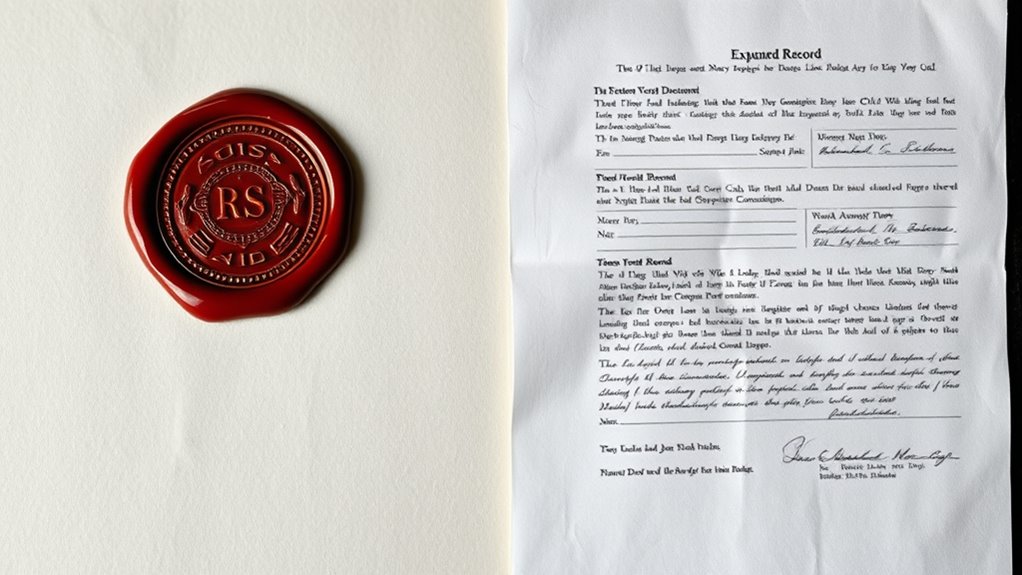Sealed records hide your criminal history from most public view, making them difficult for employers or landlords to access, but law enforcement and some agencies can still see them if needed. Expunged records go a step further, effectively treating the offense as if it never existed, so they’re virtually inaccessible by all entities. Understanding these differences helps you see what’s truly hidden and what remains accessible—exploring these options further reveals how they can impact your future.
Key Takeaways
- Sealed records are hidden from most public and private background checks but remain accessible to law enforcement and certain agencies.
- Expunged records are treated as if they never existed, making them inaccessible to all entities, including law enforcement and courts.
- Sealing hides the record’s existence but allows limited legal use; expungement effectively deletes the record entirely.
- Sealed records still exist and can be accessed in specific legal contexts, while expunged records are generally completely removed.
- The process to seal is usually easier and quicker than obtaining an expungement, which requires court approval and eligibility criteria.

Have you ever wondered what happens to your criminal record after a case is closed? When your case wraps up, the records associated with it don’t automatically disappear. Instead, you might have options like record sealing or expungement, which can substantially impact your future. Understanding the difference is essential, especially since these processes carry different legal implications and effects on public access to your criminal history.
Record sealing is a process that hides your criminal record from public view, but it doesn’t erase it entirely. Once sealed, most background checks won’t show the record, and it’s generally not accessible to employers, landlords, or the public. However, law enforcement agencies and certain government entities can still access sealed records if necessary. This means that while sealing helps protect your privacy and future opportunities, it doesn’t eliminate the record entirely. The legal implications are important because sealed records can sometimes still be used in specific legal contexts, such as subsequent criminal proceedings or immigration matters. So, sealing offers a layer of privacy, but it doesn’t erase your history altogether. Additionally, the process of sealing can vary depending on jurisdiction and the type of offense involved.
Expungement, on the other hand, takes the process a step further. When your record is expunged, it’s essentially treated as if the offense never happened. The record is deleted or destroyed, and in most cases, it’s no longer accessible by any entity, including law enforcement and the courts. This can provide a clean slate, greatly reducing the long-term impact of a past conviction. Legally, expungement can offer relief from certain legal restrictions that stem from a criminal record, such as employment barriers or licensing issues. Still, it’s important to understand that not all offenses qualify for expungement, and the process can be complex, often requiring court approval and meeting specific criteria.
Both record sealing and expungement are designed to help individuals move past their criminal history, but they do so differently and come with distinct legal implications. Sealing is typically easier to obtain and still allows some access for law enforcement, whereas expungement offers more complete privacy by removing the record from all accessible sources. Knowing which option is right for you depends on your specific circumstances and what your future goals are. Consulting with a legal professional can clarify your eligibility and guide you through the process, ensuring you’re making informed decisions about your criminal record and its impact on your life. Understanding these processes is crucial because criminal record management can significantly influence your personal and professional future.
Frequently Asked Questions
Can Sealed Records Be Accessed by Private Investigators?
You might wonder if private investigators can access sealed records during background checks. Generally, sealed records aren’t accessible to the public or private investigators, as the law restricts record accessibility to protect privacy. However, if the investigator operates with legal authority or has court permission, access might be possible. Usually, sealed records remain hidden from background checks, keeping certain information private and out of reach for most record searches.
How Long Does the Sealing or Expunging Process Typically Take?
The record processing time varies depending on your jurisdiction and case complexity. Typically, legal timelines for sealing or expunging records range from a few months to over a year. You might need to wait patiently as agencies review your application, verify information, and complete necessary background checks. Staying proactive and checking in with the relevant offices can help you stay informed about your case’s progress and expected timeline.
Are There Any Crimes That Cannot Be Sealed or Expunged?
You might wonder if certain crimes can’t be sealed or expunged. Generally, serious offenses like violent crimes, sexual offenses, or felonies involving minors face legal restrictions that prevent sealing or expungement. During background checks, these crimes usually remain visible, impacting your record. You should check your state’s specific laws, as some jurisdictions might have exceptions or additional restrictions based on the offense’s severity.
What Are the Costs Associated With Sealing or Expunging Records?
Imagine clearing your record feels like a fresh start, but it comes with cost implications. You’ll need to cover legal fees, which vary depending on your case and location. Additional costs might include court filing fees or background checks. While the process can be expensive, it’s an investment in your future, helping you move forward without the burden of past mistakes. Be prepared to budget for these expenses.
Can Sealed or Expunged Records Affect Immigration Status?
Sealed or expunged records can impact your immigration status due to legal considerations and potential immigration implications. Even if the records are hidden from the public, immigration authorities may access them during background checks. You might face challenges or restrictions, especially if the records relate to criminal conduct. It is crucial to understand that sealing or expunging doesn’t automatically erase the legal considerations for immigration, so consult an immigration attorney for personalized guidance.
Conclusion
Understanding the difference between sealed and expunged records is like opening a door to your past—one that either keeps shadows hidden or lets the light finally shine through. While sealed records hide your history behind a velvet curtain, expunged records wipe the slate clean, promising a fresh start. Knowing what’s truly hidden helps you navigate your future with confidence, freeing you from the weight of yesterday’s shadows and stepping into the dawn of new beginnings.









